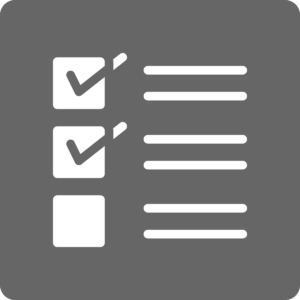
BIT Metagenomics logo with go.ncsu.edu/bitmetagenomics website listed on the right On the left there are several bacteria
We hope you enjoyed the weekend and are ready for a new module in the metagenomics course.
Podcast Script Review
You are now able to access scripts for peer review and feedback. Use the same link you used for submission. Reviews are due by Friday at 5 PM.
Module 5 will address: What are OTUs and ASVs?
We will learn about 16S/ITS metagenomic analyses using QIIME2 and DADA2.

Checklist icon in gray box. Purchased from The Noun Project.
Our checklist for this week can be accessed here.
Read article 3 this week and annotate with at least ten meaningful annotations.
This week we will work on the QIIME2/DADA2 activities during our lab session.
Please watch the playlist of HPC tutorials on under Module 5 in Moodle.
Overview
What are OTUs and ASVs?
In this module, we will learn about 16S/ITS metagenomic analyses using QIIME2 and DADA2.
Upon successful completion of this module, you will be able to:
- MO 5.1. Compare and contrast OTUs and ASVs.
- MO 5.2. Discuss and critically evaluate each step of a 16S QIIME standard operating procedure (SOP).
- MO 5.3. Perform basic data analyses using QIIME and a downloaded dataset.
- MO 5.4. Apply tools from QIIME tutorial to analyses of other data sets:
- Create OTU tables to use for analyses in QIIME and elsewhere (e.g., R for plotting).
- Use alpha and beta diversity tools to assess richness and diversity within and between samples.
- Plot several different types of graphs using QIIME’s interface.
- MO. 5.5. Define and explain the concepts of metadata, OTU, rarefaction curve.
To complete this module, you will need to:
- Watch Module 5 video and complete TopHat questions
- Complete HPC training. Complete TopHat questions on HPC/QIIME.
- Annotate the third article using Persusall.
- Complete reading questions/ reflection in TopHat.
- Draft approach for the data analysis project.
- Meet with Digital Media Librarian for podcast recording.